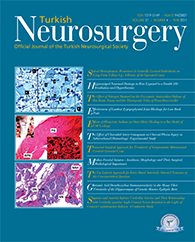2Marmara University, Faculty of Pharmacy, Department of Pharmacology, Istanbul, Turkey
3Marmara University, Faculty of Medicine, Department of Medical Biology, Istanbul, Turkey
4Marmara University, Faculty of Medicine, Department of Histology & Embryology, Istanbul, Turkey
5Marmara University, Faculty of Pharmacy, Department of Biochemistry, Istanbul, Turkey
6Marmara University, Faculty of Medicine, Department of Physiology, Istanbul, Turkey DOI : 10.5137/1019-5149.JTN .4736-11.0 AIM: Spinal cord injury (SCI) leads to an inflammatory response that generates substantial secondary damage within the tissue besides the primary damage. Ghrelin, 28 amino-acid peptide, has been shown to modulate the release of proinflammatory cytokines and exert antiinflammatory effects. The aim of the current study was to investigate the anti-inflammatory effects of ghrelin, in a rat model of SCI.
MATERIAL and METHODS: Wistar albino rats were divided as control, SCI, and ghrelin-treated (10 μg/kg/day, ip) SCI groups. In order to induce SCI, a standard weight-drop method that induced a moderately severe injury (100 g/cm force) at T10, was used. Injured animals were given either ghrelin or saline 15 min post-injury.
RESULTS: In plasma samples, neuron-specific enolase (NSE) and S-100β protein levels were evaluated. Spinal cord samples were taken for histological examination or determination of myeloperoxidase (MPO) activity and DNA fragmentation. SCI caused significant increases in plasma NSE and S-100β levels and tissue MPO activity and DNA damage. On the other hand, ghrelin treatment improved histological findings as well as biochemical parameters while it failed to improve the impairment of the neurological functions due to SCI.
CONCLUSION: The present study suggests that ghrelin could reduce SCI-induced oxidative stress and exert anti-inflammatory effects in the spinal cord following trauma.
Keywords : Ghrelin, Spinal cord injury, Neuroprotective, Rat




